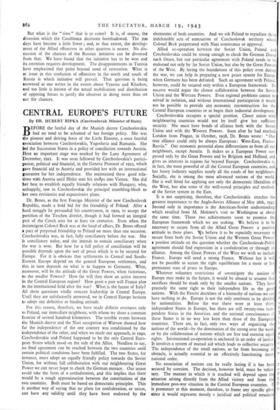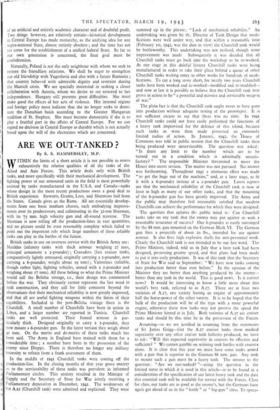CENTRAL EUROPE'S FUTURE
By DR. HUBERT RIPKA (Czechoslovak Minister of State)
Dr. Benes, as the first Foreign Minister of the new Czechoslovak Republic, made a bold bid for the friendship of Poland. After a bard struggle he persuaded his countrymen, in 1920, to accept the partition of the Teschen district, though it had formed an integral part of the Czech area for at least six centuries. Even when the intransigent Colonel Beck was at the head of affairs, Dr. Benes offered a pact of perpetual friendship to Poland on more than one occasion. Czechoslovakia was, in fact, fully conciliatory before the war. She is conciliatory today, and she intends to remain conciliatory when the war is won. But how far a full policy of conciliation will be possible depends upon the sort of peace which is to be secured for Europe. For it is obvious that settlements in Central and South- Eastern Europe depend on the general European settlement, and this in turn depends on what is to happen to Germany. What, moreover, will be the attitude of the Great Powers, when victorious, to the smaller Powers? How far will they show an active interest in the Central European region? How great a part will France play in the international field after the war? What is the future of Italy? All these questions vitally concern leadership in Central Europe. Until they are satisfactorily answered, we in Central Europe hesitate to adopt any definitive or binding attitude.
For this reason, therefore, we have made definite overtures only to Poland, our immediate neighbour, with whom we share a common frontier of several hundred kilometres. The terrible events between the Munich decree and the Nazi occupation of Warsaw showed how far the independence of the one country was conditioned by the independence of the other, and when we made our approach, in 1940, Czechoslovakia and Poland happened to be the only Central Euro- pean States which stood on the side of the Allies. Needless to say, no final agreement can be reached between the two countries until certain political conditions have been fulfilled. The two States, for instance, must adopt an equally friendly policy towards the Soviet Union, for without full collaboration with our neighbouring Great Power we can never hope to check the German menace. Our union could take the form of a confederation, arid this implies that there would be a rough approximation between the constitutions of the two countries. Both must be based on democratic principles. This is another way of saying that no plans for confederation, or union, can have any validity until they have been endorsed by the
electorates of both countries. And we ask Poland to repudiate those indefensible acts of annexation of Czechoslovak territory which Colonel Beck perpetrated with Nazi connivance or approval.
Allied co-operation between the Soviet Union, Poland and Czechoslovakia could be strong enough to check the German Drang each Osten, but our particular agreement with Poland needs to be endorsed not only by :he Soviet Union, but also by the Great Powers of the West. By laying the foundations of this policy even during the war, we can help in preparing a new peace system for Europe when Germany has been defeated. Such an agreement with Poland, however, could be secured only within a European framework. Its success would argue the closest collaboration between the Soviet Union and the Western Powers. Even regional problems cannot be solved in isolation, and without international participation it would not be possible to provide any economic reconstruction for the Central European countries or to begin their industrial development.
Czechoslovakia occupies a special position. Closer union with neighbouring countries would not by itself give her sufficient security. She must have bonds of alliance both with the Soviet Union and with the Western Powers. Soon after he had reached London from Prague, in October, 1938, Dr. Benes wrote: " Our true alliance could only be always European: West-East, France- Russia." Onr economic potential alone differentiates us from all our neighbours, except Austria. It makes us a European Power sur- passed only by the Great Powers and by Belgium and Holland, and gives us interests in regions far beyond Europe. Czechoslovakia is, in fact, the most powerful of all the Central European countries, and her heavy industry supplies nearly all the needs of her neighbours. Socially, she is among the most advanced nations of the world. She is well fitted for applying not only the democratic liberalism of the West, but also some of the well-tested principles and methods of the Soviet system in the East.
It is not surprising, therefore, that Czechoslovakia attaches the greatest importance to the Anglo-Soviet Alliance of May 26th, 1942. Second only in importance is the American-Soviet understanding which resulted from 'M. Molotov's visit to Washington at about the same time. These two achievements seem to promise the European framework which we are seeking. We believe it to be necessary to secure from all the Allied Great Powers a positive attitude to these plans. We believe it to be especially necessary to secure from both the Soviet Union and the Western Great Powers a positive attitude on the question whether the Czechoslovak-Polish agreement should find expression in a confederation or through an alliance. Among the Great Powers of the West we wish to include France. Europe will need a strong France. Without her it will not be possible to secure the right equilibrium for a more or less permanent state of peace in Europe.
Whatever voluntary restrictions of sovereignty the nations of Europe may make in the future, it would be absurd to assume that sacrifices should be made only by the smaller nations. They have precisely the same right to their independtnt life as the great nations. With the Fascist doctrines of a hierarchy of nations we can have nothing to do. Europe is not the only continent to be divided by nationalities. Before the war there were at least thirty independent States in Europe, but there are still twenty-two inde- pendent States in the Americas, and the national consciousness of these States is in no way less keen than those of the European countries. There are, in fact, only two ways of organising the nations of the world—by the domination of the strong over the weak, or by the collaboration of nations which are free and exercise equal rights. International co-operation is anchored in an order of justice. It involves a system of mutual aid which leads to collective security. The independence of the small nations, so far from becoming an obstacle, is actually essential to an effectively functioning inter- national order.
No association of nations can be really lasting if it has been secured by coercion. The decision, however bold, must be volun- tary. The manner in which it is reached will depend upon the situation arising directly from the Allied victory and from the immediate post-war situation in the Central European countries. It is premature at this moment, therefore, to frame any specific plan, since it would represent Merely a juridical and political structur of an artificial and entirely academic character and of doubtful profit. Two things however, are relatively certain—historical development in Central Europe has made monarchy, as the unifying idea for any supra-national State, almost entirely obsolete ; and the time has not yet come for the establishment of a unified federal State. So far as our own generation is concerned, the final goal must be confederation.
Naturally, Poland is not the only neighbour with whom we seek to restore the friendliest relations. We shall be eager to strengthen our old friendship with Yugoslavia and also with a future Rumania ; that country behaved with admirable dignity and restraint during the Munich crisis. We are specially interested in seeking a closer collaboration with Austria, whom we desire to see restored to her independence. Hungary still presents great difficulties. She must make good the effects of her acts of violence. Her internal regime and foreign policy must indicate that she no longer seeks to domi- nate the Danubian basin according to the Greater Hungarian tradition of St. Stephen. She must become democratic if she is to play a fruitful part in the affairs of Central Europe. For we can regard no decision in Central Europe as durable which is not actually based upon the will of the electorates which are concerned.



























 Previous page
Previous page